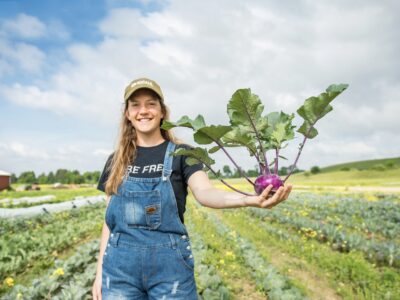The B in “bee” might stand for billions. Crop production in the U.S., dependent on pollinators, generates over $50 billion yearly, and one out of every three mouthfuls of food we eat exists thanks to these essential insects.
Unfortunately, honeybees are in serious trouble from rising global temperatures, habitat loss, increased natural disasters, pesticides, air pollution, lack of nutrition, and parasites. In the U.S., their populations are rapidly declining in the winter, and since 1962, the number of bee colonies per hectare of crops requiring pollination has dropped 90%!
These declining insect populations are bringing more awareness to biodiversity, like the United Nations’ recent dialogue at their Biodiversity Conference (COP15).
As industries shift toward more climate-positive goals and initiatives, investments in innovative agriculture and biotechnology companies will continue to rise.
Where to start? Bees! Startups are using science and technology to strengthen and protect the creatures and make them target specific crops for pollination (seriously). Here are some of the most innovative bee-based breakthroughs from the past year.
Bee Supplements
Beeflow, a California-based biotech startup, is essentially copying Marvel’s Captain America Super Soldier Serum — using supplements to boost the natural capacities of organisms — but for bees instead of humans. The company derives the immune-boosting substance from floral nectar and plant-based hormones. The insects are fed the supplement in a lab, drastically increasing their cold weather endurance and pollen load capacities.
Photo Courtesy M. Roth
The final step is getting the bees to actually target specific crops, avoiding wasting their enhanced strength and endurance on random wildflowers.
To solve this problem, Beeflow is identifying and replicating “floral volatiles,” the unique scent released by plants to attract pollinators. From there, the bees are exposed to a specific crop’s floral volatile and fed a “reward” of sugar syrup. This method establishes a strong connection between the “reward” and the particular crop’s scent, training them to target it.
Beeflow is starting with blueberries, releasing a synthetic version of the fruit’s “floral volatile” to honeybees.
They are fed a sugar reward and, over time, target blueberry crops over others, increasing crop yields. Although the process feels like science fiction, it has increased blueberry yields by up to 60%!
What’s next? Founder Matias Viel says, “The next one that is coming is avocado pollination.”
First Vaccine For Insects
Bees are officially the first insect to get a USDA-approved vaccine in the U.S. Georgia biotech company Dalan Animal Health’s preventative vaccine protects honeybees from an aggressive disease called American foulbrood. The bacterial illness, which peaked in the 1800s and early 1900s, weakens and kills larvae. Infected spores can last up to 50 years, so eliminating any chances of resurgence is vital for bee populations.
The vaccine is food-based — no mini needles. Scientists inject the vaccine into royal jelly, a nutritious substance consumed by all larvae in a colony, ensuring all bees are properly vaccinated once they consume it. The company is looking to expand its vaccine to protect and prevent other diseases affecting honeybees, although there is still much work to be done.
Surprisingly, the approval of a vaccine to prevent a niche disease affecting insects is vital for the entire agricultural industry. Annette Kleiser, Dalan’s CEO, sees this as a breakthrough step toward future vaccines protecting livestock.
Photo Courtesy Myriams-Fotos
Precise Pollination
Sticking with the biotech company naming style of including the word “bee” in the name, BeeHero is a Palo Alto startup providing precise pollination for crop growers. The business uses artificial intelligence and data analytics to increase crop yields while allowing farmers and beekeepers to monitor their hives and crops remotely.
BeeHero has raised more than $60 million to date from big backers, including venture capital firms such as General Mills and ADM.
As bee populations dwindle and U.S. honey consumption reaches historic highs, the importance of pollinators has never been more apparent.
Gin and Honey
If bees had a favorite alcohol, it might be Caledonia Spirits’ Barr Hill Gin, which is made with real honey (Jim Been, anyone?). The two founders, a home brewing supply store owner and a beekeeper, began gin distilling in 2011. Before long, the two were distilling multiple batches a day and winning awards for their liquor.
Photo Courtesy Valerie Sampson
Since 2017, the distillery has been supporting bees in a unique way: Bee’s Knees Week, a social media campaign spreading awareness for pollinator protection. The distillery plants 10 square feet of habitat for every person who shares a photo of the signature Bee’s Knees cocktail and tags Bar Hill Gin on social media during the designated week. More recently, it pledged to plant 250,000 square feet of bee habitat.
Bee End
Bees are fascinating creatures. They’re a few centimeters tall but responsible for billions of dollars worth of crop pollination and millions of pounds of honey production yearly. The world, from governments to nonprofits to private businesses, is pushing for less pollution and more protection. A growing number of biotech and agriculture startups are rising to meet these challenges. These companies’ technology and innovation won’t stop at honeybees; they’re just the first step.





